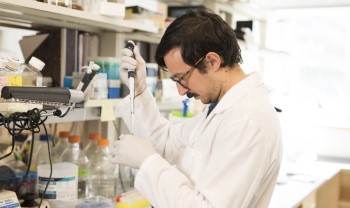Medical Oncology
Medical oncologists are doctors who study and treat cancer with drugs (chemotherapy), biological agents (this includes immunotherapy), and hormones. Our distinguished faculty of medical oncologists includes physician leaders with diverse clinical, educational and research expertise.
Oncologists Specialized by Disease Type
BIDMC medical oncologists are specialized by cancer type; for example, they are medical oncologists who treat lung cancer, or breast cancer, and so on. Not unlike the quarterback on a football team, your medical oncologist will help coordinate and guide the care you need for your particular cancer, and talk with you and your family about treatment decisions.
Meet Our Medical Oncologists
For a list of our medical oncologists on staff, with their specialties and clinical interests, please visit Find A Doctor.
Oncology Treatment
BIDMC has specialized medical oncology treatment areas for inpatient and outpatient care, where expert oncology nurses and volunteers — cancer survivors who are trained for this role — offer special encouragement and comfort. In a warm and supportive atmosphere, where families are welcome, our physicians, nurses, volunteers and social workers attend to your treatment needs and address your concerns and questions.
Treatment Combinations
Your doctor may prescribe one or a combination of chemo, biological and hormonal therapies, with or without radiation. The recommendations will always be made based upon the most up-to-date information in the medical literature.
- Chemotherapy and biological therapy work in different ways. Biological therapy harnesses your own immune system to help fight cancer or use drugs that target specific points of vulnerability in the cancer cell. For example, cancer vaccines, a type of biological therapy, trigger responses in the body to battle cancer using its own resources. In comparison, chemotherapy targets and kills the cancer cells directly.
- "Targeted" cancer therapies are treatments that are designed to interfere with a process in the cancer cell that is critical to its function. They interfere with specific (targeted) molecules that fuel tumor growth, and often spare healthy cells. Some of the most successful targeted therapies to date are used to treat blood cancers, such as chronic myelogenous leukemia and acute lymphoblastic leukemia.
- The growth of some cancers depends on estrogen, the predominant female hormone that stimulates breast cancer, or androgens, the predominant male hormone that stimulates prostate cancer. Hormonal therapy uses special drugs to attack these cancers by altering or blocking hormone production. Our oncologists have helped to discover new strategies to use these hormonal treatments for improved patient care.
How is Treatment Administered?
The details of cancer treatment depend on where your cancer is located and the type of drugs and therapy you need. Most often you will receive intravenous drugs, through a vein, but doctors could also prescribe oral medications (a pill or capsule to swallow); drugs delivered through an artery to treat a single area (for example, the liver); drugs injected into a muscle or the tumor itself; or drugs delivered into the abdominal or chest cavity, or spinal canal. Also, some drugs are topical; that is, rubbed on the cancer area on the skin.
Clinical Trials and Research
You may benefit from standard protocols (drugs and treatment administered in accordance with well-established guidelines) that improve the outcome of your particular cancer and symptoms. Or you may qualify for one of our extensive clinical trials - research studies that are designed to find better treatments for cancer patients based on the most updated information from around the world.
As a founding member of the Dana Farber/Harvard Cancer Center (DF/HCC), the comprehensive cancer center at Harvard Medical School, Beth Israel Deaconess is part of the largest cancer research consortium in the country, with access to a broad array of the most current clinical trials. BIDMC's Cancer Clinical Trials Office coordinates trials in connection with DF/HCC and the Eastern Cooperative Oncology Group (ECOG), among others.

